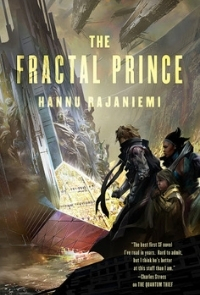
The Fractal Prince
Written by: Hannu Rajaniemi
Reviewed by: Brad Williamson
Genre: Science-Fiction
Score: 3.5/5
As with The Quantum Thief, this is a wild ride through space, time, and imagination. Any complaints with the novel or Rajaniemi’s writing cannot be lain at the feet of a lack of vision or creativity. Sadly, however, despite the undeniably spectacular moments this novel has in store, it also has glaring holes.
This novel carries over much from The Quantum Thief, both the good and the bad. Thus beginning at the end is appropriate here, because Rajaniemi is developing a pattern with The Fractal Prince: unsatisfactory conclusions. I feel like I’m repeating myself, but he did the same thing in the first book. I loved the characters, the story, the structure, the plot and action, the writing and explanations, and then it’s as if he runs out of ideas, instead choosing to abruptly end the book without a worthy explanation. He did the same thing in The Quantum Thief, only to begin The Fractal Prince in a fresh and interesting manner, so this is not me losing faith, but it is most assuredly annoying.
But I loved his science even more in this one. He retains his unique style of showing unbelievably advanced technology without explaining what it is or how it works. Then, through interactions and story developments, the reader begins to fathom at least part of what’s going on. No one, not even Hannu I’d claim, understands everything that transpires in these books, but you do grasp more at the end than you did at the beginning, which is the point. It’s actually pretty fun at the end when so much regarding the technology is still unexplained yet nothing about how it works or what it does has been left unaddressed. He writes like someone who knows where the future is going but doesn’t know how it gets there, like he had a prophetic vision where he saw everything but didn’t have time to learn what it all means. And with The Fractal Prince, he shares this vision.
This style of writing and explaining lends the novel an element of diorama; it almost feels like you’re doing more than reading at times, like you’re hooked up to sensory and VR equipment aligning with the tale yet unaware that any such thing could possibly be happening. In this way the novel functions like a meta-meta-story. And while this is great, it’s also confusing.
In the end, the novel is satisfying, but much like in The Quantum Thief, a lack of cohesion and a highly dissatisfying conclusion hold it back from being great. It’s still very good, though, and fans of science-fiction will enjoy this book and series.
Recent Comments